With the demand for paper growing and the industry becoming ever more organized, calls for businesses to take sustainable growth paths that will secure future energy and environment has become more vocal. In this backdrop, Indian Pulp & Paper Technical Association (IPPTA) organized its 59th Annual General Meeting and annual seminar in Kolkata on the theme “Fostering the Future of Energy and Environment in Pulp & Paper Industry” on 23 – 24 February, 2024.
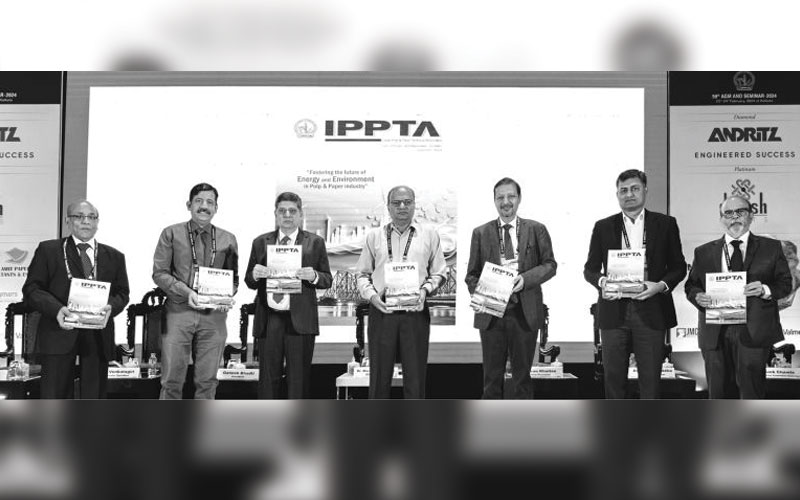
As the world braces up to adopt practices essential for a cleaner and greener future, the Indian Pulp & Paper Technical Association (IPPTA) is devising ways to develop a sustainable future for the pulp and paper industry by adopting new technologies, improving the existing operations and investigating the value of specific technology tools related to energy and environment.
IPPTA organized its 59th AGM and seminar on the theme ‘Fostering the Future of Energy and Environment in Pulp & Paper Industry’ at Taj City Centre New Town in Kolkata on February 23 and 24, 2024. The event witnessed participation from the who’s who of the industry including Chief Guest, Padma Shri Professor Manindra Agrawal from IIT, Kanpur; Mr. Vivek Chawla, Whole Time Director & CEO, Emami Paper Mills Limited; Mr. K. S. Venkatagiri, Executive Director, CII; Mr. Ganesh Bhadti, President of IPPTA and Director (Operations) Seshasayee Paper and Boards (SPB) Limited; Mr. Pavan Khaitan, Vice President of IPPTA & Managing Director of Kuantum Papers; Mr. Ashwin J. Laddha, MD & CEO, Orient Paper & Industries Limited (OPIL), who made presentations on how to resolve issues related to energy efficiency and the environment faced by the industry.

The Inaugural Session commenced with the lighting of lamp by Prof. Manindra Agrawal who said on the occasion that while digital technology has changed our lives, things such as cyberattacks and large scale data leaks can make our lives very tough and lead to significant losses. It is not tough to manage cyber security and mitigate the threats to a great extent if one takes the threats seriously and follows the basic steps.
As leaders of the industry, we should focus on practices like governance, recognizing that cyber threats pose an imminent danger to an organization. Steps should be initiated to ensure the security of your entire system, which should include a policy on cybersecurity in every organization.
Then comes risk assessment management. One of the most important steps is to have a cyber asset inventory in an organization. All digital assets should be meticulously listed and tracked so that whenever one of the assets develops a certain vulnerability, it becomes easier to handle it.
Watch: Top Paper Companies 2023
The critical software running in your systems must have licensed copies. Large organisations should have a security operation centre, which is a setup that can automatically monitor all the systems connected with your organisation and detect vulnerabilities.
Final point is training. You can have the best policies and the best systems in place, but if the people using the systems are not aware of the existing dangers, then none of the other approaches will work.
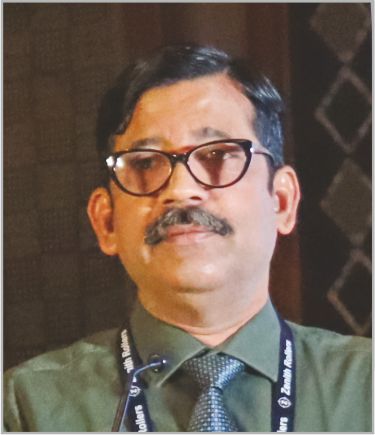
Delivering the keynote address, Mr. Venkatagiri stressed on the need to work towards achieving net zero. He appealed to consider converting their headquarters into a zero net energy building (ZNEB) or green buildings. He said the Bombay House of the Tata Group, a 160-year-old heritage building, was converted into a green building and was now working towards becoming a ZNEB. The energy consumption came down from 100 to 28, improving the efficiency significantly and showing the commitment of the company towards a sustainable future.
He said a lot of efforts in terms of FSC (Forest Stewardship Council) are being made in the paper sector in India. Consider developing an Indian eco-label for paper products. Net zero decarbonization is not a far-fetched concept. We should work towards becoming a net zero sector and the individual companies should also work in this direction.
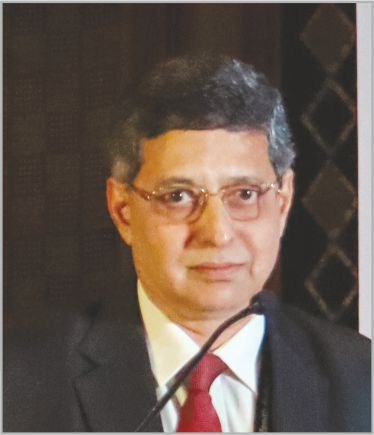
Mr. Bhadti started by calling energy and environment as interconnected. He said we cannot imagine the production, transportation or consumption of energy without having any significant impact on the environment. We have travelled from the Stone Age to the current age and from the pre-industrialization period to the present era with a lot of development in all industrial sectors, not just in the paper industry.
However, looking from the environmental point of view, the process has led to an overall depletion of global natural wealth by about 45 percent, ranging from 22 percent to 88 percent depending on the economy of a nation. Around 75 percent of the earth’s land has been significantly altered by human activities. We consume an estimated 55 billion tonnes of fossil energy every year, a figure quoted by the United Nations (UN). July, 2023 was declared as the hottest month in the last 120,000 years, which shows the significant impact on the environment.
We need to strike a balance between energy consumption and environment conservation, which should be our prime responsibility.
The present energy system needs to change rapidly to prevent catastrophic effects. The UN has declared the period between 2021 to 2030 as a decade of restoration. They say if we do not act today, if we do not achieve some set targets by 2030, then we may reach the point of no return. That is why 2030 is very significant in industrial growth, for geographical protection, biodiversity preservation and also to control global warming.
The rapid race to achieve net zero has already begun and it requires a lot of efforts. While some nations have decided to achieve net zero by 2050, India and other countries are looking at 2070 to achieve the target.
We are becoming more and more environmentally concerned. We have seen that many countries have already crossed the critical threshold of registering temperatures 2 degrees more than the pre-industrialization period. This is our baseline and the first step. We need to go back to carbon sequestration or decarbonization of the pre-industrialization level. The second step is to replenish the planet and reverse the effects of damage done so far. It is estimated that by 2040, about 60 percent of energy will be based on fossil only, which at present is about 85 percent.
Initiatives such as the Lifestyle for the Environment (LiFE) Movement launched by the government, the notification issued by the Ministry of Environment, Forest and Climate Change on October 12, 2023 regarding the green credit management, coupled with certain projects announced by some organisations, are very encouraging and promising.
New energy landscapes are coming up. Harnessing energy from space has become the new topic for innovation and energy conservation activities, which has the potential to offer several benefits to move towards 100 percent renewable energy and continuous supply.
The pulp and paper industry, which has a significant impact on the environment, is very forthcoming in achieving these targets. It is currently at the threshold of innovation, sustainability and environmental stewardship.
Tremendous opportunities are available before us to move towards renewable energy. One key area where the pulp and paper industry can make a difference is the source of energy and its consumption. Many of the integrated mills are now at 75 percent renewable energy. Many paper mills are adopting green code with the help of the CIA certification. We are looking forward to Industry 4.0 taking new initiatives for sustainable environmental practices.
One more important area today is collaboration. We cannot work in isolation. We have to collaborate with different industries, organisations, institutions and government agencies to make a policy or a model, in order to ensure implementation of these sustainable practices.
Also Read: Paper Mart Emagazine Feb-Mar, 2024
To foster the future of energy and environment, we require an unwavering commitment, innovation, and collaboration. By embracing renewable energy sources and energy efficient methods, coupled with promotion of sustainable forestry practices, we can chart a very bright, sustainable and prosperous future for us and for the generations to come. The efforts we make today will decide our future.
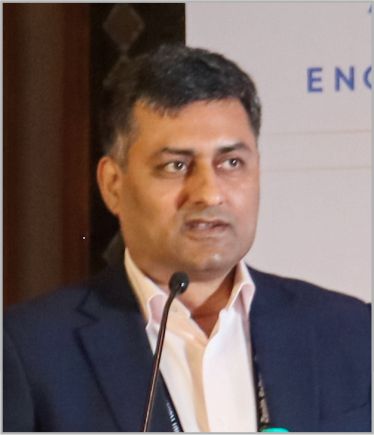
Mr. Laddha laid stress on trust, calling it one of the most important soft aspects of business. As per Mr. Laddha, the theme at the World Economic Forum this year was reinstating trust in the global economy. Climate change has become a big topic of discussion in the West, so is the greenwashing of economies. The wealth being managed globally under the ESG funds is around USD 65-70 trillion, which reflects the scale and the size of the amount involved. But when this kind of pace is generated, beneath that not too much of action is actually towards the cause of climate. This is leading to the lack of trust globally between different institutions and governments.
In this scenario, India has come out as a shining star. Several global corporations are reallocating funds to India. As an industry, we have an incredible opportunity to restore and get an edge over others.
“One key area where the pulp and paper industry can make a difference is the source of energy and its consumption. Many of the integrated mills are now at 75 percent renewable energy. Many paper mills are adopting green code with the help of the CIA certification,”—- Mr. Ganesh Bhadti, President, IPPTA”
Energy conservation is important for us and also makes good business sense. India is entering the Amrit Kal and thus, it is time for us to think big and chase bigger dreams. There is a tremendous opportunity for us to take the whole ecosystem forward. We have an integrated mill at Orient and typically all paper mills are situated in remote and isolated locations, cut off from the hustle and bustle of the city.
We at Orient are working in over 1,089 villages, spread over around 12 lakh acres, collaborating with several NGOs and government organisations. We have set up a professional team and each year, we are planting close to twice the amount of trees we are going to harvest. We are encouraging the locals and the communities to become self-reliant on three broad parameters – not only on economic factors, dependent on wood harvesting or agroforestry, but also encouraging them to take up other opportunities. We are also engaging with them for education and other such initiatives. This is going to cement the trust.
It is also an example for the paper industry to become the fulcrum of change and contribute towards carbon neutrality. The paper industry is relatively in a catch-up mode in technological adoption. We are trying to leapfrog the technology, which requires trust.
We are living in the world of Artificial Intelligence (AI). In our industry, there is a tremendous need for us to trust the power of technology and invest in it, since it will do more good than harm. We have to come out of that shell of resistance to change and build those capabilities for our team. Digitization is an incredible opportunity for our industry, which is going to happen only if we trust this technology.
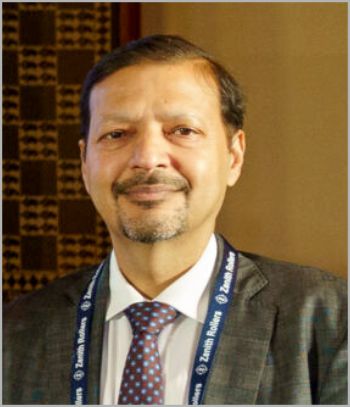
Mr. Khaitan, proposed the vote of thanks. Sharing his thoughts on how collectively the industry can deal with the challenges, he said that our effort is to bring people together and exchange knowledge between them for each other’s benefit. We have to collectively deal with our impact on the future. Whatever actions we take today are certainly going to impact our future generation. Our children will ask us, what did you do for us? Whatever we do, we should remember it will have an impact on the future. Each drop in the ocean counts and also leaves a large ripple. Each one of us can leave a positive impact by our actions.



